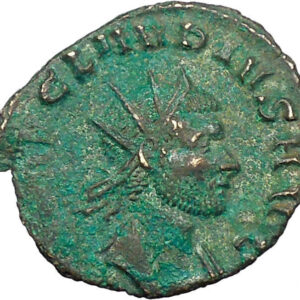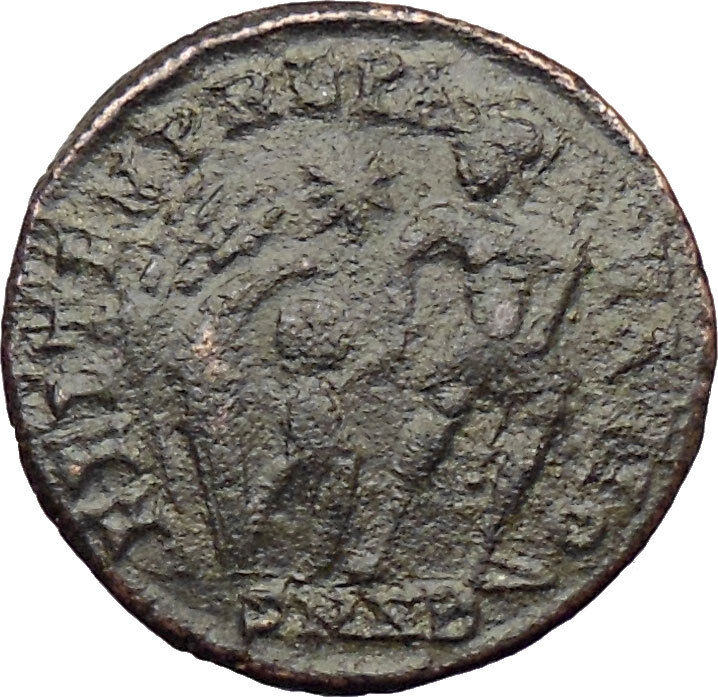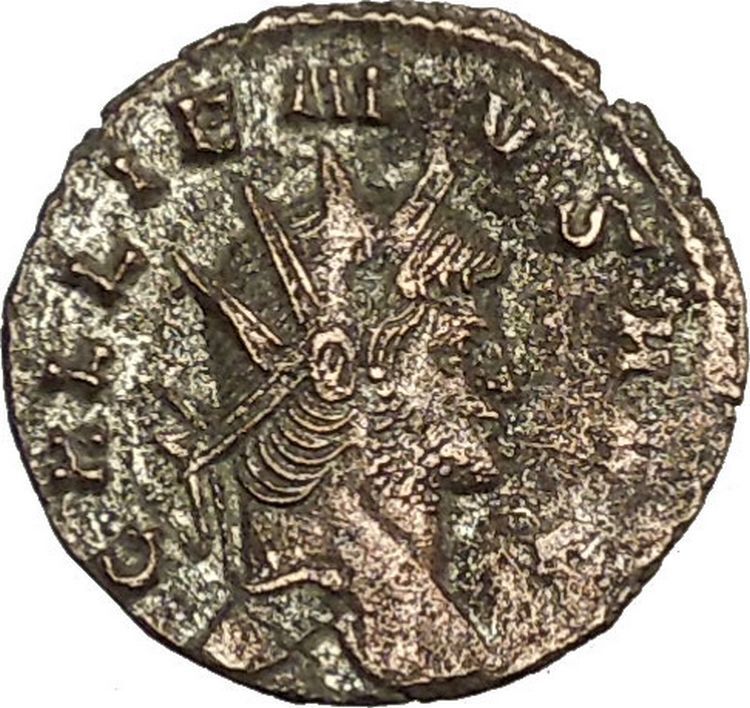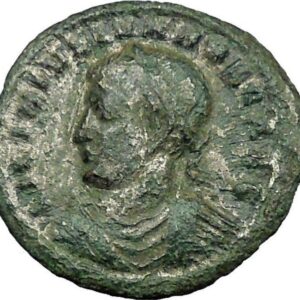|
Commodus – Roman Emperor: 177-192 A.D.
Billon Tetradrachm 25mm (11.60 grams) of Alexandria in Egypt Struck Year 22 (from regnal dating of his father, commencing March A.D. 161) = 181-182 A.D.
Reference: Köln 2207; Dattari (Savio) 3861; K&G 41.29
Laureate head right.
Athena seated left on throne, shield at side, holding Nike and spear; L KB (date) to left.
You are bidding on the exact item pictured, provided with a Certificate of Authenticity and Lifetime Guarantee of Authenticity.
Athena or Athene (Latin: Minerva ), also referred to as Pallas Athena, is the goddess of war, civilization, wisdom, strength, strategy, crafts, justice and skill in Greek mythology . Minerva , Athena’s Roman 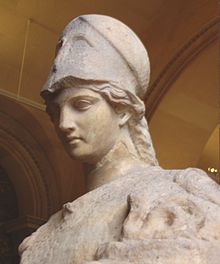 incarnation, embodies similar attributes. Athena is also a shrewd companion of heroes and the goddess of heroic endeavour. She is the virgin patron of Athens . The Athenians built the Parthenon on the Acropolis of her namesake city, Athens, in her honour (Athena Parthenos). Athena’s cult as the patron of Athens seems to have existed from the earliest times and was so persistent that archaic myths about her were recast to adapt to cultural changes. In her role as a protector of the city (polis), many people throughout the Greek world worshiped Athena as Athena Polias (“Athena of the city”). incarnation, embodies similar attributes. Athena is also a shrewd companion of heroes and the goddess of heroic endeavour. She is the virgin patron of Athens . The Athenians built the Parthenon on the Acropolis of her namesake city, Athens, in her honour (Athena Parthenos). Athena’s cult as the patron of Athens seems to have existed from the earliest times and was so persistent that archaic myths about her were recast to adapt to cultural changes. In her role as a protector of the city (polis), many people throughout the Greek world worshiped Athena as Athena Polias (“Athena of the city”).
Alexandriaa was founded by Alexander the Great in April 331 BC as Ἀλεξάνδρεια (Alexándreia). Alexander’s chief architect for the project was Dinocrates . Alexandria was intended to supersede Naucratis as a Hellenistic center in Egypt, and to be the link between Greece and the rich Nile Valley. An Egyptian city, Rhakotis , already existed on the shore, and later gave its name to Alexandria in the Egyptian language (Egyptian *Raˁ-Ḳāṭit, written rˁ-ḳṭy.t, ‘That which is built up’). It continued to exist as the Egyptian quarter of the city. A few months after the foundation, Alexander left Egypt and never returned to his city. After Alexander’s departure, his viceroy, Cleomenes , continued the expansion. Following a struggle with the other successors of Alexander, his general Ptolemy succeeded in bringing Alexander’s body to Alexandria.
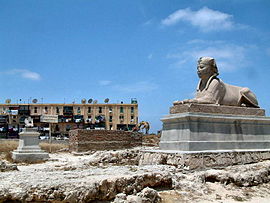
Alexandria, sphinx made of pink granite , Ptolemaic .
Heptastadion and the mainland quarters seem to have been primarily Ptolemaic work. Inheriting the trade of ruined Tyre and becoming the centre of the new commerce between Europe and the Arabian and Indian East, the city grew in less than a generation to be larger than Carthage . In a century, Alexandria had become the largest city in the world and, for some centuries more, was second only to Rome. It became Egypt’s main Greek city, with Greek people from diverse backgrounds.
Alexandria was not only a centre of Hellenism , but was also home to the largest Jewish community in the world. The Septuagint , a Greek translation of the Hebrew Bible , was produced there. The early Ptolemies kept it in order and fostered the development of its museum into the leading Hellenistic center of learning (Library of Alexandria), but were careful to maintain the distinction of its population’s three largest ethnicities: Greek, Jewish, and Egyptian . From this division arose much of the later turbulence, which began to manifest itself under Ptolemy Philopater who reigned from 221–204 BC. The reign of Ptolemy VIII Physcon from 144–116 BC was marked by purges and civil warfare..
The city passed formally under Roman jurisdiction in 80 BC, according to the will of Ptolemy Alexander , but only after it had been under Roman influence for more than a hundred years. It was captured by Julius Caesar in 47 BC during a Roman intervention in the domestic civil war between king Ptolemy XIII and his advisers, and the fabled queen Cleopatra VII . It was finally captured by Octavian , future emperor Augustus on 1 August 30 BC, with the name of the month later being changed to August to commemorate his victory.
In AD 115, large parts of Alexandria were destroyed during the Kitos War , which gave Hadrian and his architect, Decriannus , an opportunity to rebuild it. In 215, the emperor Caracalla visited the city and, because of some insulting satires that the inhabitants had directed at him, abruptly commanded his troops to put to death all youths capable of bearing arms. On 21 July 365, Alexandria was devastated by a tsunami (365 Crete earthquake), an event still annually commemorated 17 hundred years later as a “day of horror.” In the late 4th century, persecution of pagans by newly Christian Romans had reached new levels of intensity. In 391, the Patriarch Theophilus destroyed all pagan temples in Alexandria under orders from Emperor Theodosius I . The Brucheum and Jewish quarters were desolate in the 5th century. On the mainland, life seemed to have centred in the vicinity of the Serapeum and Caesareum , both of which became Christian churches . The Pharos and Heptastadium quarters, however, remained populous and were left intact.
In 619, Alexandria fell to the Sassanid Persians . Although the Byzantine Emperor Heraclius recovered it in 629, in 641 the Arabs under the general Amr ibn al-As captured it during the Muslim conquest of Egypt , after a siege that lasted 14 months.
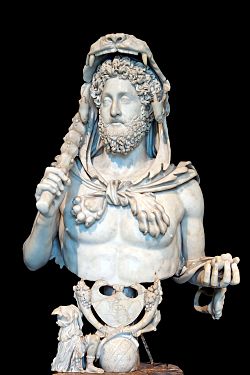 Lucius Aurelius Commodus Antoninus (31 August 161 – 31 December 192) was a Roman Emperor who ruled from 180 to 192 (also with his father, Marcus Aurelius , from 177 until 180). The name given here was his official name at his accession to sole rule; see Changes of name for earlier and later forms. His accession as emperor was the first time a son had succeeded his father since Titus succeeded Vespasian in 79. Commodus was the first emperor “born to the purple“; i.e., born during his father’s reign. Lucius Aurelius Commodus Antoninus (31 August 161 – 31 December 192) was a Roman Emperor who ruled from 180 to 192 (also with his father, Marcus Aurelius , from 177 until 180). The name given here was his official name at his accession to sole rule; see Changes of name for earlier and later forms. His accession as emperor was the first time a son had succeeded his father since Titus succeeded Vespasian in 79. Commodus was the first emperor “born to the purple“; i.e., born during his father’s reign.
Commodus vies with Caligula and Nero as Roman history’s most perverse and sadistic of rulers. Like Caligula and Nero before, Commodus was an ordinary (by imperial standards) ruler who succeeded Marcus Aurelius, his father, upon his death. In his one major positive deed, Commodus called off the expedition against the Germans which his father had commenced on terms favorable to Rome. He sped off to Rome where he much preferred living the perks of an emperor to the dirty business of waging wars. While he whiled away his time pursuing a hedonistic lifestyle he was happy to delegate administrative responsibilities to others.
Unfortunately, his appointees never seemed to last long on the job. Whether through incompetence, bad luck or corruption, one by one these fell and needed replacement. Commodus little by little began gaining a taste for power as the shuffling of his foremen took place and, finally, he decided to manage the empire himself. It is starting with this period that Commodus began to act increasingly unpredictably and cruel. A botched conspiracy against him, orchestrated by no less than his beloved sister Lucilla, was discovered and his surviving the episode turned him afterwards into a highly paranoid individual who had countless officials executed for disloyalty imagined or real.
In his final year of life he shocked Romans of all classes by personally moonlighting as a gladiator. Of course, these fights were arranged so that he could invariably come out the victor. Because of this a record-breaking 700+ victories were scored in his name, each one ending in the deaths of one or more gladiators and/or wild beasts at the Colosseum. A successful conspiracy against him was finally hatched by one of his lovers who first tried poisoning him but he threw up and a wrestler was summoned who strangled him to death on the last day of the year 192.
The recent Hollywood release “The Gladiator” is a fictionalized account of Commodus as emperor which has him at odds with a popular gladiator.
|







 Lucius Aurelius Commodus Antoninus (31 August 161 – 31 December 192) was a Roman Emperor who ruled from 180 to 192 (also with his father, Marcus Aurelius , from 177 until 180). The name given here was his official name at his accession to sole rule; see Changes of name for earlier and later forms. His accession as emperor was the first time a son had succeeded his father since Titus succeeded Vespasian in 79. Commodus was the first emperor “born to the purple“; i.e., born during his father’s reign.
Lucius Aurelius Commodus Antoninus (31 August 161 – 31 December 192) was a Roman Emperor who ruled from 180 to 192 (also with his father, Marcus Aurelius , from 177 until 180). The name given here was his official name at his accession to sole rule; see Changes of name for earlier and later forms. His accession as emperor was the first time a son had succeeded his father since Titus succeeded Vespasian in 79. Commodus was the first emperor “born to the purple“; i.e., born during his father’s reign.

